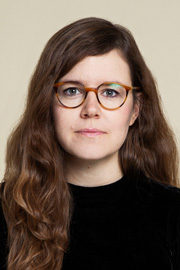
Rille Pihlak
Manchester
United Kingdom
Tell us a bit about your career so far. What is your current activity?
I am currently a Senior Research Fellow in the Experimental Cancer Medicine Team at the Christie NHS Foundation Trust.
I am originally from Estonia and finished my oncology training there in 2016. After finishing, I applied and was successfully awarded a PhD fellowship on pancreatic cancer at the University of Manchester and The Christie NHS Foundation Trust. This PhD, that I have just finished, investigated clinical aspects of pancreatic cancer and so naturally I am extremely passionate about pancreatic cancer and GI cancers in general. I hope for a future career that would allow me to combine clinical research and GI oncology.
What motivates you?
Complex patients issues and questions. This is especially true in pancreatic cancer which is a terrible disease with short outcomes and multiple complex issues happening to the patients at the same time. Every time I talk to a patient in clinic, their questions lead me to want to understand these problems and motivate me to explore further if there is no answer. I think the amazing thing about oncology research is how quickly new trials and treatment options come for patients and how the whole community is focused on finding ways to improve outcomes for our patients. We are all constantly curious and try to find better ways to help our patients.
Why did you choose to become a medical oncologist?
Oncology was always the most fascinating subject for me in medical school. There is a beautiful balance in oncology where you see the rapid pace of research, but you also have complex patients needing treatment urgently in clinic. It constantly makes you want to be a better doctor- enhance your communication and support with patients; understand the science behind novel treatments and conduct research yourself to help the next patients. I do not think any other specialty has that and that is why I find it the most captivating.
What does your involvement with ESMO and the Young Oncologists Committee (YOC) mean to you?
I feel extremely lucky to be part of the ESMO YOC, surrounded by likeminded people motivated to improve oncology education in Europe. I am very passionate about education and teaching and I believe that the YOC is an excellent way of helping oncology trainees in different countries and bringing them together as a community. We have already seen the amazing job the YOC has done throughout the years and I think we have great motivation and drive to improve our scope even further. I must say that the people in YOC are amazing to work with too!
Do you have some good advice you would like to share with your international colleagues?
Be curious, look for new opportunities, learn from each other! ESMO is a great place to start- join and come to our meetings and preceptorships - they are there for you to learn and find collaborators (or friends) around the world. I would also highly recommend going for fellowships abroad or even short visits to other centres - it truly expands your views about all areas of oncology and gives you loads of motivation for the future.
